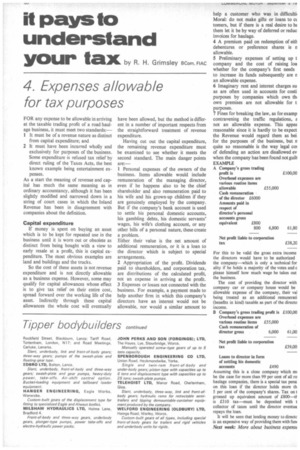4. Expenses allowable for tax purposes
Page 82

If you've noticed an error in this article please click here to report it so we can fix it.
FOR any expense to be allowable in arriving at the taxable trading profit of a road haulage business, it must meet two standards: 1 It must be of a revenue nature as distinct from capital expenditure; and 2 It must have been incurred wholly and exclusively for purposes of the business. Some expenditure is refused tax relief by direct ruling of the Taxes Acts, the best known example being entertainment expenses.
As a start the meaning of revenue and capital has much the same meaning as in ordinary accountancy, although it has been slightly modified and narrowed down in a string of court cases in which the Inland Revenue has been in disagreement with companies about the definition.
Capital expenditure If money is spent on buying an asset which is to be kept for repeated use in the business until it is worn out or obsolete as distinct from being bought with a view to early resale at a profit, this is capital expenditure. The most obvious examples are land and buildings and the trucks.
So the cost of these assets is not revenue expenditure and is not directly allowable as a business expense. However, some may qualify for capital allowances whose effect is to give tax relief on their entire cost, spread forward over the working life of the asset. Indirectly through these capital allowances the whole cost will eventually have been allowed, but the method is different in a number of important respects from the straightforward treatment of revenue expenditure.
Having cut out the capital expenditure, the remaining revenue expenditure must be examined to see whether it meets the second standard. The main danger points are:
1 Personal expenses of the owners of the business. Items allowable would include remuneration of the managing director, even if he happens also to be the chief shareholder and also remuneration paid to his wife and his grown-up children if they are genuinely employed by the company. But if the company's bank account is used to settle his personal domestic accounts, his gambling debts, his domestic servants' wages. his wife's clothing account, or any other bills of a personal nature, these create a problem.
Either their value is the net amount of additional remuneration, or it is a loan to the director which is subject to special arrangements.
2 Appropriation of the profit. Dividends paid to shareholders, and corporation tax, are distributions of the calculated profit, not an expense in arriving at the profit.
3 Expenses or losses not connected with the business. For example, a payment made to help another firm in which this company's directors have an interest would not be allowable, nor would a similar amount to help a customer who was in difficultil Moral: do not make gifts or loans to ct tomers, but if there is a real desire to ht them let it be by way of deferred or reduc invoices for haulage.
4 A premium paid on redemption of eith debentures or preference shares is allowable.
5 Preliminary expenses of setting up t company and the cost of raising loa whether for the company's first needs to increase its funds subsequently are r an allowable expense.
6 Imaginary rent and interest charges su as are often used in accounts for costi purposes by companies which own till own premises are not allowable for t purposes.
7 Fines for breaking the law, as for examp contravening the traffic regulations, e not an allowable expense. This appee reasonable since it is hardly to be expect the Revenue would regard them as bei for the purposes of the business, but n quite so reasonable is the way legal cco, of defending an action are disallowed ev when the company has been found not guilt EXAMPLE A Company's gross trading profit is £100,00 Overhead expenses are various routine items allowable £55.000 Cash remuneration of the director £6000 Amounts paid in respect of director's personal accounts gross equivalent £800 800 6,800 61,80 Net profit liable to corporation tax £38,20 For this to be valid the gross extra income the directors would have to be authorized the company—which is only a technical for ality if he holds a majority of the votes and c please himself how much wage he takes out the business.
The cost of providing the director with company car or company house would be allowable expense of the company, their val being treated as an additional remunerati (benefits in kind) taxable as part of the directo income.
B Company's gross trading profit is £100,00 Overhead expenses are various routine items /55,000 Cash remuneration of director gross 6,000 61,00 Net profit liable to corporation tax 09,00 Loans to director in form of settling his domestic accounts £490 Assuming this is a close company which mi be the case for more than 99 per cent of all ro haulage companies, there is a special tax pena on this loan if the director holds more th 5 per cent of the company's shares. Tax on t grossed up equivalent amount of £800—tt is £310 tax—must be deposited with t collector of taxes until the director eventua repays the loan.
It will be seen that lending money to directc is an expensive way of providing them with fun' Next week: More about business expense










































































































































